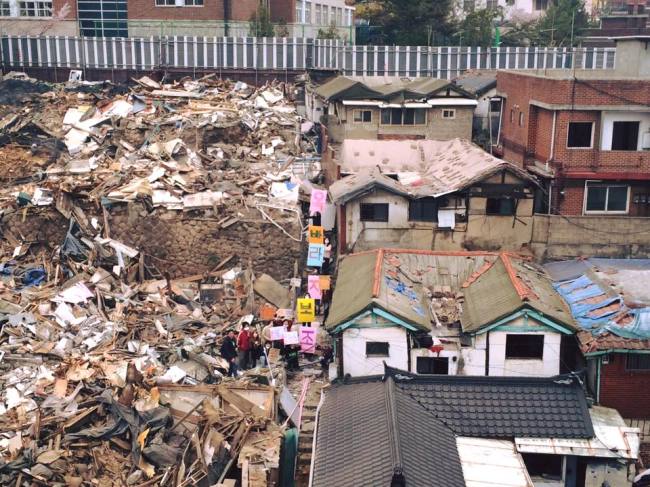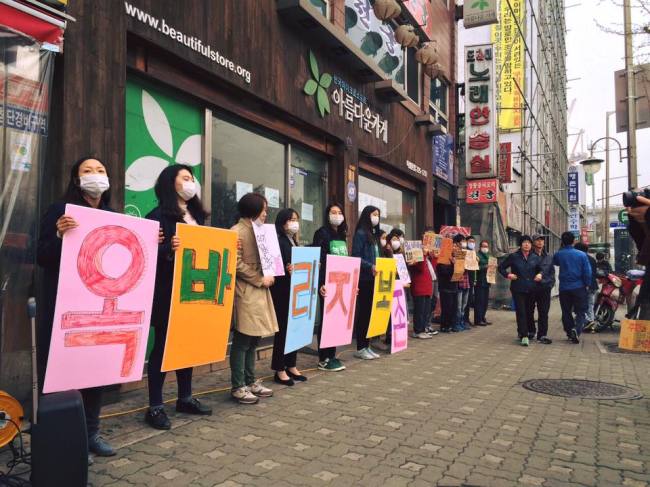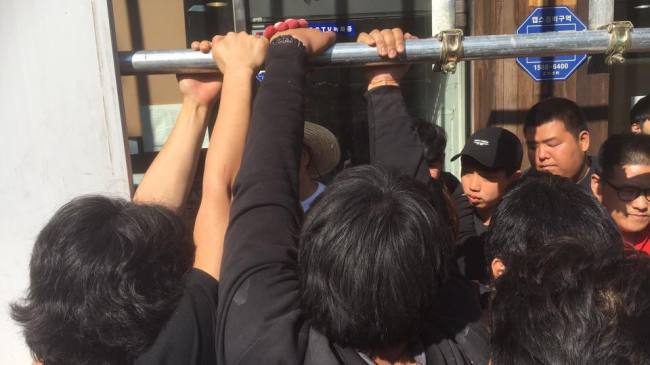An old, narrow alley located in central Seoul’s Muhak-dong, Jongno-gu, known as Okbaraji Golmok or Inn Alley, is now 80 percent demolished, with very few buildings left to be knocked down in the area designated as a redevelopment zone in 2006.
As is often the case with redevelopment plans, residents are split on its urban renewal. The alley was approved for redevelopment by Seoul Metropolitan Government in July 2015, citing it as “suitable for redevelopment considering the area’s poor infrastructure and the age of the buildings.”
Four buildings of 16-story apartment complex Lotte Castle will be built on the redevelopment site spanning some 1,000 square meters when the demolition is completed by this summer.
 |
Most of the buildings at Okbaraji Golmok in Jongno, Seoul, have been demolished as part of a redevelopment project. (Okabaraji Golmok Preservation Committee) |
Residents and civic groups who oppose its redevelopment cite the historical significance of the alley.
Located across Seodaemun Prison History Hall, which was built in 1907 to detain and execute independence fighters and activists such as Ryu Gwan-soon and Kim Koo during the Japanese occupation, there are traces of Korea’s history that go back a century in the back of the alley.
Cheap, shabby inns located here were frequented by families who came to visit and provide support for their detained loved ones, because inmates were poorly fed and ill-treated by the prison staff. The name Okbaraji literally translates into “prison support.”
“There is no country like South Korea which tries to destroy its historical sites,” said Lee Gil-ja, the owner of five-story Gubonjang, one of the remaining inns.
“I have been sleeping outside since I was kicked out 14 days ago (when the district office forcibly destroyed my home.) I lost my home, have no income and I’m especially sorry to my unmarried daughter for letting this happen,” Lee told The Korea Herald. She had run the business for 41 years.
On May 4, the Seoul Central District Court ordered the compulsory evacuation of her building. She refused to move until the court’s order to execute the evacuation process on May 17.
Historian Fuji Takeshi, who studied modern history and is a member of Okbaraji Preservation Committee, argued that “not many are aware of the historical significance of the area.”
“Not many citizens, public officials, or even historians, knew that Okbaraji itself was a living symbol of Korea’s turbulent history, simply because they did not know the presence of the alley,” said Takeshi at a press conference in front of Seoul City Hall on Monday.
“History is not just about special people. Without ordinary people who supported inmates at the Seodaemun Prison, fighting for independence would not have been possible,” added Takeshi, underlining that normal people’s lives and their homes should be remembered by preserving the alley.
 |
Civic group members protest against demolition of the alley. (Okbaraji Preservation Committee) |
Jongno-gu, responsible for construction in the area, told The Korea Herald that “there is no turning back (of the project)” as demolition is already in progress. An official from the district’s City Housing Development department explained that “the redevelopment association foresees a lot of financial damage if the construction is delayed.” Adding that a lack of documentation to prove the area’s historical significance was another reason for permitting the project.
The redevelopment association of the area -- mostly formed of native landlords who decided to raze the entire area with the consent of majority of the residents -- was established in 2010, four years after Seoul City designated the area for renewal. They argue that the snowballing interest on loans for the project will be a burden if the project is stalled. Association members say they took a loan of about 26.5 billion won ($22.2 million) and pay at least 200 million won in interest each month. The money was used to support association members to relocate.
In the process of demolition amid resistance by some of the old residents, there are allegations that the redevelopment association wielded excessive power to raze buildings. Old residents say they were forced to evacuate by yongyeok ggangpae -- criminal gangs who disguise themselves as legitimate business and are often mobilized to forcibly remove residents for demolition.
 |
Old residents block yongyeok ggangpae -- criminal gangs who disguise themselves as legitimate business and are often mobilized to forcibly remove residents for demolition -- when the court ordered to execute the evacuation process on May 17. (Okbaraji Preservation Committee) |
Two weeks ago, Seoul Mayor Park Won-soon visited the site after a physical altercation on May 17 between the resisting residents and the gang trying to vacate Gobongjang.
“Even if it costs me a compensation suit, I will block (forced evacuation) by all means,” Park said at the office of redevelopment association. He also proposed to have marathon talks with those involved to seek a solution but the discussion has not been held yet due to protesters opposing participation of the builder and the redevelopment association. The demolition of the remaining houses has halted since then.
However, as of now, there are no laws to protect residents who are evacuated from their own homes in the course of redevelopment, nor can the mayor stop the demolition. Seoul City had vowed to eradicate forced evacuations in the city’s development projects in 2013.
The city government said that insufficient discussions among residents was the main reason for the crisis. Although it had recommended residents to have at least five meetings before demolition begins, the association members and opposing residents had only three so far. The city’s recommendation for talks has no legal binding force.
Experts say that the approval of the redevelopment project in Okbaraji Golmok was the result of a flawed law.
Kim Il-jung, economics professor at Sungkyunkwan University, said in a recent interview that the Environment Renewal Development Act should be revised.
“The current law just deepens social complications, since there is no concrete regulation that verifies the public benefit of urban renewal plans in the area,” Kim was quoted as saying.
“If the redevelopment plan had been fully reviewed regarding the public benefit as well as compensation scheme for long-term residents, such an indiscriminate renewal project would have not happened,” he added.
By Kim Da-sol (
ddd@heraldcorp.com)










![[Today’s K-pop] Blackpink’s Jennie, Lisa invited to Coachella as solo acts](http://res.heraldm.com/phpwas/restmb_idxmake.php?idx=644&simg=/content/image/2024/11/21/20241121050099_0.jpg)